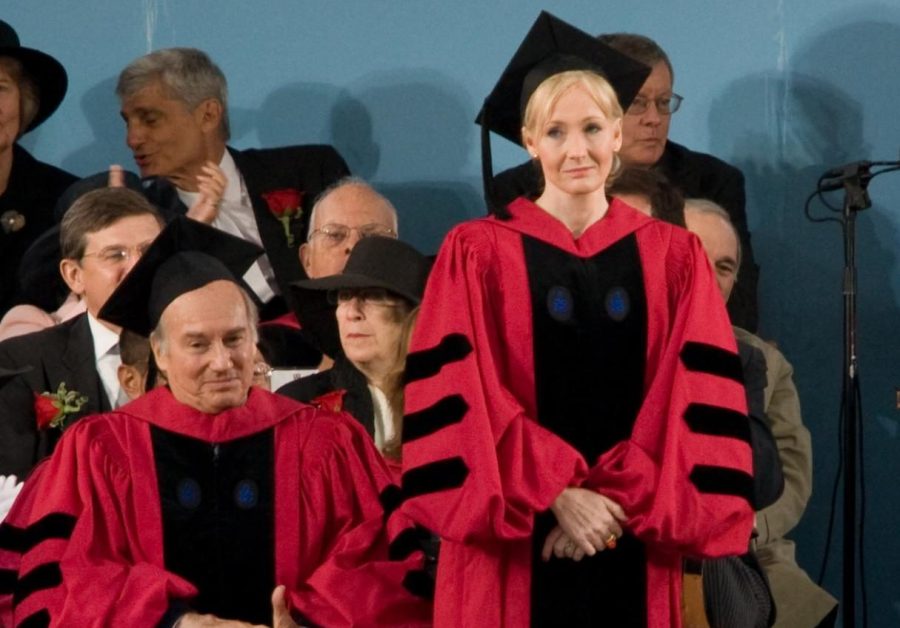Opinion | J.K. Rowling still exemplifies transphobia
Courtesy of Ken Schwarz / Flickr
J. K. Rowling stands to accept her honorary Doctor of Letters Degree from Harvard University in 2008. This image has been cropped from the original. Columnist Matthew Lozano argues that the real transphobia in J.K. Rowling’s beliefs lies in her fixation on identity politics instead of advocating for trans issues.
Mar 8, 2023
There’s been a recent buzz about the new Harry Potter-inspired open-world game, “Hogwarts Legacy.” With that, the conversation surrounding the author of the series, J.K. Rowling, and her past transphobic remarks have resurfaced.
The discussion surrounding whether or not consumers should support the game is an insightful one to have, and the topic is eloquently reviewed by our opinions editor. But regardless of concern for the video game, J.K. Rowling herself should be more closely examined in light of recent public attention to her transphobic views.
It is evident based on Rowling’s public statements that she holds transphobic beliefs. But it is important to first review Rowling’s claims before diving into the reasons why she is bigoted.
In 2019, she expressed her support for Maya Forstater, a researcher who publicly expressed anti-transgender views and subsequently lost her job. In 2020, Rowling started to reveal her views regarding transgender people with tweets arguing the idea that trans women are not real women due to their sex being male.
A common talking point for those who argue against the validity of trans identities tends to center around sex, mainly boiling down to how transgenderism goes against basic biology. Rowling promotes the idea that being trans goes against the basic principle of chromosomal sex itself — a trans woman is not a woman because she has XY chromosomes.
Get The Daily Illini in your inbox!
The issue with this line of reasoning is that it makes the idea of transgender identity congruent with biological sex when sex has nothing to do with a trans person’s gender identity.
To elaborate on the definition of transgenderism, a trans person does not deny the sex they were born with. What does fluctuate is their gender identity, which is the internal sense of differentiation from being male or female. This is often exhibited in outward gender expression and appearance or the use of hormones to present as masculine or feminine.
Thus, the very premise of Rowling’s beliefs is rooted in a lack of understanding of what it means to be transgender.
Focusing an argument around the basis of sex alone lacks compassion for trans identities and demonstrates a refusal to understand trans people in general. But whether a person believes a trans woman is a real woman is not the pinnacle argument that must be discussed.
In other words, Rowling’s views are harmful alone, but she amplifies her bigotry by pushing a narrative around the argument of transgenderism and sex instead of arguing the issues trans people actually face.
And it is because she centers her beliefs around this narrative that she reinforces her transphobia and creates a moral panic around transgenderism itself. Purely arguing sex is arguing semantics, which holds no tangible value in the real world.
Does deeming a trans individual the gender they identify with really affect people in day-to-day life, or is it an issue exclusive to online culture?
Rowling continues to hyperfixate on issues that create moral panic with her views regarding the “trans-bathroom” debate.
In her response essay to the public’s criticism of her beliefs, she touches on the Gender Recognition Reform Bill passed in Scotland. In essence, the bill allows trans individuals to receive legal certification stating they are the gender they identify without a medical diagnosis.
In the essay, she draws attention to this issue by stating how “any and all men can come inside” women’s bathrooms from the bill’s ratification. She pushes the idea that allowing trans people to claim their gender identity would open the door to a slew of sexual assault cases.
This is yet another example of Rowling masking her transphobic rhetoric as social justice by focusing on a trivial and exaggerated issue.
Trans women being able to use the bathroom of their choice does not automatically “allow” anyone to sexually assault cis women. Nothing absolves the crime of sexual assault; it fortunately is still illegal.
What solidifies Rowling’s absolute reluctance to understand trans people is not solely the views themselves, nor the narrative she has built. It is her imprudent desire to pose as a supporter of trans issues with statements like, “I respect every trans person’s right to live any way that feels authentic and comfortable to them.”
The problem is that her words themselves are hollow, merely a Trojan horse designed to masquerade herself as a supporter of the trans community, when in reality she could not be further from it.
Bigotry isn’t as black and white as homophobes screaming slurs at you — it is usually the opposite. In Rowling’s case, she disguises her views as being understanding or supportive of trans issues while actively spewing rhetoric that alienates trans identities.
With more media attention that aims to exonerate Rowling, it is important to recognize the danger in her beliefs.
What needs a more critical eye, however, is the deceptive framing of her victimhood as she unconvincingly reaches to personify herself as a true champion of LGBTQ+ voices.
Matthew is a sophomore in LAS.






